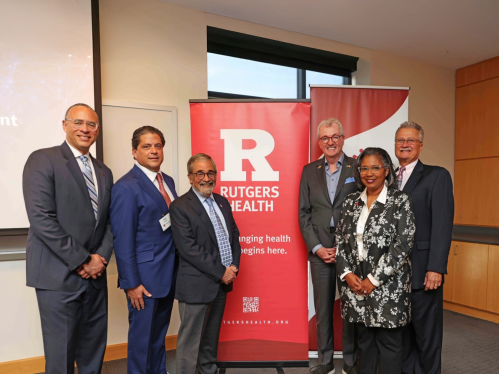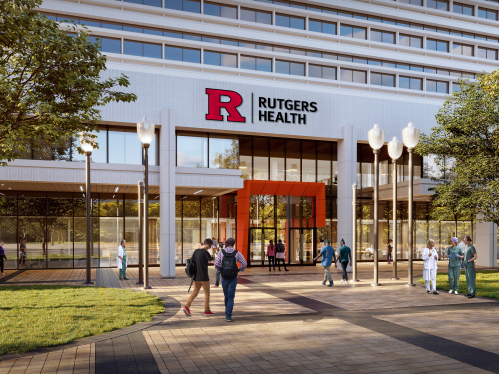
OneRBHS:
Year 3 Progress Report
A Commitment to Health for All
In the third year of the Rutgers Health Strategic Plan, we deepened our commitment to improving health for all—through groundbreaking research, innovative clinical care, transformative education, and meaningful community engagement.
Below, we illustrate our progress, followed by key accomplishments mapped to our strategic objectives. Together, we are shaping the future of health—one breakthrough, one patient, and one community at a time.
Inspiring the Next Generation
The Rutgers Health Service Corps was established to connect health professions students with university health professionals, resources, and partners, creating impactful service-learning opportunities. Through screenings, health education, and prevention programs, the initiative has reached thousands, advancing health equity while preparing the next generation of healthcare and public health leaders.

Building a Legacy of Innovation
Rutgers Health continues to build on its legacy as a leader in innovative research and team-based excellence with the renewal of three major National Institutes of Health Center awards, underscoring its commitment to pioneering discoveries that improve lives across New Jersey and beyond.
- The New Jersey Alliance for Clinical and Translational Science secured a $47.5 million, seven-year award to drive innovation in patient-centered research.
- The Rutgers Cancer Institute of New Jersey received $17.5 million over five years, sustaining its status as a National Cancer Institute-designated Comprehensive Cancer Center.
- The Environmental and Occupational Health Sciences Institute (EOHSI) successfully renewed its NIEHS Environmental Health Sciences (P30) core grant for another five years, marking an extraordinary 37 consecutive years of NIH funding.

New Standards in Patient Rights
The Patient Rights and Responsibilities Standard was developed to promote clear communication, equitable access, and high-quality care for patients and providers. This standard ensures that all patients, guests, and healthcare professionals experience a safe, inclusive, and respectful environment in Rutgers Health clinical spaces.

Welcoming New Leadership
Angela Starkweather joined Rutgers Health as the new dean of the School of Nursing (SON). In addition, the SON celebrated 50 years of its well-established midwifery program that expands the profession in NJ and consistently graduates a diverse class of midwives reflective of the state’s population.

Merging Health and AI
The Center for Biomedical Informatics and Health AI was established to drive innovation in data-driven health care and biomedical research. Supported by the Roadmaps for Collective Academic Excellence initiative from University Academic Affairs, the center serves as a catalyst for positioning Rutgers as a national and international leader in computational medicine and health AI.

Recognizing Faculty and Staff Excellence
The fifth annual Chancellor Awards celebrated the outstanding contributions of Rutgers Health faculty and staff across all mission areas and roles. The Lifetime Distinguished Service Award for Staff recognized Sally Marshall (Center for Advanced Biotechnology and Medicine), and the Lifetime Distinguished Achievement Award for Faculty recognized Distinguished Professors Jeffrey Laskin (Director of the Division of Toxicology at Environmental & Occupational Health Sciences Institute) and Tamara Minko (Chair, Department of Pharmaceutics at the Ernest Mario School of Pharmacy).
Promoting Employee Well-Being
The Office of the Promotion of Well-Being was created to serve as a central hub for wellness activities at Rutgers Health, dedicated to advancing health and well-being for both our internal and external communities.

A Decade of Impact
The year-long Rutgers Health 10th Anniversary Celebration concluded, commemorating its accomplishments and looking to the future.

Enhancing our Infrastructure
As part of its goal of enabling systems and structures, Rutgers Health convened more than 20 Information Technology leaders from across our units to strengthen security, enhance organizational alignment, and standardize practices.









Amidst a period of transformative change, Rutgers Health stands as a beacon of innovation and progress. With strategic foresight and determination, we have navigated challenges and seized opportunities, achieving important goals that propel us toward a future defined by excellence and impact. Below is a summary of our strategic plan goal-specific accomplishments. Some of the listed accomplishments link to more than one goal but are listed once with one selected goal.
Progress on Mission-Based (“M”) Goals
-
Actualizing interprofessional synergies to improve clinical care and the patient experience

The objective of this goal is to leverage the comprehensive and unique aspects of Rutgers Health, coupled with the unique affiliations with RWJBarnabas Health, University Hospital in Newark, and the VA New Jersey Health Care System, to lead by improving the health of our communities through the delivery of the highest quality of, and access to, integrated and interprofessional clinical care and preventive health.
-
Created leadership positions for non-physicians on the Joint Committee, Health Education Executive Committee, Interprofessional Program Advisory Committee, and other Rutgers Health leadership committees.
-
Leveraged the Clinical and Translational Science Awards (CTSA) for key projects that support population health strategies, including oncology, cardiovascular care, and health services research.
-
Joined the CMS Making Care Primary initiative, a 10.5-year value-based care model, improving access to coordinated, high-quality primary care.
-
Led by Rutgers New Jersey Medical School (NJMS) physicians, University Hospital’s Liver Transplant Program was recognized as the nation’s leader in three-year liver transplantation survival.
-
University Behavioral Health Center’s (UBHC) Center for Integrated Care received a $2.6 million grant from the Health Resources and Services Administration (HRSA) to provide training for integrated care and substance use disorder treatment.
-
Rutgers Cancer Institute of New Jersey was redesignated as the state’s only Comprehensive Cancer Center by the National Cancer Institute.
-
Robert Wood Johnson Medical School recruited from Johns Hopkins University Jeanne M. Clark as the chair of the Department of Medicine and Vikas Dharnidharka as the chair of the Department of Pediatrics and as physician-in-chief of the Bristol-Myers Squibb Children’s Hospital at Robert Wood Johnson University Hospital.
-
The Rutgers School of Dental Medicine is in its second year of the grant-funded Vet Smiles program offering free dental treatment to New Jersey military veterans with profound gratitude to those who have selflessly served our nation.
-
-
Educating, training, and preparing a diverse New Jersey biomedical and health sciences workforce

The objectives of this goal focus on fostering excellence in the delivery of health professions and biomedical sciences education by leveraging the strengths of our interprofessional community of educators across Rutgers Health to recruit, train, support, and prepare a diverse and highly competitive New Jersey biomedical and health sciences workforce. The objectives also highlight the need to enhance the Rutgers Health-wide teaching and learning infrastructure and elevate the recognition of educators and educational administration.
- Angela Starkweather joined Rutgers Health as the new dean of the School of Nursing (SON). (SON). In addition, the SON celebrated 50 years of its well-established midwifery program that expands the profession in NJ and consistently graduates a diverse class of midwives reflective of the state’s population.
-
Rutgers Health received full continued accreditation as a sponsoring institution for Graduate Medical Education following an enterprisewide accreditation site visit.
-
Amy Murtha was selected to serve as founding dean of the future Rutgers School of Medicine and as administrative contact for the Liaison Committee on Medical Education (LCME) accreditation.
-
Perry Halkitis, dean of the Rutgers School of Public Health, received the 2024 Helen Rodriguez-Trías Social Justice Award from the American Public Health Association for his advocacy work and research aimed at improving the health of LGBTQ+ people and populations.
-
The Ernest Mario School of Pharmacy and Robert Wood Johnson Medical School marked ten years of the pharmacy and medicine (PharmD/MD) dual-degree program, the only such program in the nation.
-
The NJMS Pathway to Scientist Programs continue to expose Newark high school and Rutgers-Newark undergraduate students to biomedical research careers, preparing the next generation of scientists and health care professionals.
-
The Green Lab Group sustainability initiative created a lab sustainability training module, which will be integrated into Rutgers' standard lab safety training, ensuring future researchers adopt environmentally responsible practices.
-
The Rutgers Health Chancellor’s Office hosted its annual summit with a dedicated focus on the education mission. Leaders from across Rutgers Health reviewed education-related goals within the strategic plan, celebrated progress, identified ongoing challenges, and developed specific, actionable steps for implementation, all shaped by broad input from educational leaders.
-
Building on Rutgers Health strengths and opportunities to excel in discovery and innovation

The objectives of this goal focus on building on the existing strengths of established and emerging strategic research areas, identifying and cultivating new areas of impactful and innovative research, and growing our research portfolio and presence to be leaders among our peer institutions. An important Rutgers Health advantage is its affiliations with RWJBarnabas Health, University Hospital in Newark, and the VA New Jersey Health Care System, which provide access to patients for translational and clinical research, and proximity to New Jersey’s extensive bio¬technology and pharmaceutical companies. A robust Rutgers Health research enterprise will improve health in New Jersey, address health-related social inequities, and provide an engine for discovery, innovation, and economic development.
-
Rutgers Health’s research portfolio totaled $564 million in research and sponsored program awards in fiscal year 2024. This remarkable growth reflects the dedication of our research community and the impact of our work across diverse fields of health sciences.
-
The inaugural Learning Health System Scientist Training and Research Program (LHS STAR NJ) research awards supported projects that use LHS science to develop and implement real-world solutions for health system improvement.
-
Rutgers Health, together with RWJBarnabas Health (RWJBH), launched the Center for Climate, Health, and Healthcare. Their mission is to “improve the health and health care of people and communities in New Jersey, nationally, and globally by combatting the climate health crisis through research, education, and community-oriented climate action.”
-
Rutgers Brain Health Institute celebrated ten years of advancing neuroscience and brain health research, marking a decade of innovation with an awards ceremony honoring faculty.
-
Rutgers Center for State Health Policy celebrated its 25th anniversary, having established itself as a trusted partner in the formulation and evaluation of health policy in New Jersey.
-
New Jersey Medical School made investments in state-of-the-art research technology, including next-generation sequencing (NovaSeq X plus) and new proteomics and imaging platforms, providing researchers with advanced tools to conduct innovative studies.
-
The Rutgers-NYU Resource Center for Alzheimer’s and Dementia Research in Asian and Pacific Americans (RCASIA) and the Rutgers-NYU Center for Asian Health Promotion and Equity (CAHPE) awarded grants to support research on the health of Asian older adults, as well as studies on cardiometabolic and mental health in diverse Asian populations.
-
-
Engaging meaningfully with local and global communities

The objectives of this goal ensure that, as a public institution, we are engaged with our local and global communities to advance research, education, and clinical care through service that addresses relevant community health challenges and needs. By engaging with these communities in ongoing collaborations, we can work together to improve and sustain health. Another important aspect of community engagement is to expose students and trainees to learning opportunities that expand consciousness of their impact on the communities they serve and increase awareness of the cultural and societal factors that affect health.
-
Rutgers Health Food Pantry and pantry+ at Rutgers University-Newark received HOPE Awards from the Community Food Bank of New Jersey, which recognized their efforts to address college student hunger and improve the health of students in need through nutritious food and supportive services.
-
New Jersey Medical School students launched the Bergen Barbers program to improve hospitalized patients' outlook by providing haircutting and shaving services.
-
Rutgers Health formed the Asthma Corps, using education to end pediatric asthma deaths in Newark and beyond, a partnership between the Ernest Mario School of Pharmacy and working with the Greater Newark Health Care Coalition to conduct online and in-person training in community centers to teach asthma basics.
-
Developed student-run clinics to provide free primary care and health prevention services to uninsured patients as well as asylee services and advocacy in the Greater New Brunswick area.
-
Collaborated with staff at the Rutgers Alumni Association to develop systematic ways to engage alumni as community members to share their experience within the classroom, as mentors, and in career networking efforts to enrich the educational experience for students and faculty.
-
The Human papillomavirus (HPV) Vaccination Campaign, led by Rutgers Student Health and the Office of Population Health, collaborated with Rutgers Communications and Marketing (R-Comm) and the School of Communication and Information to create strategic health messages, improving vaccination outreach efforts.
-
Rutgers Health and partners were awarded a five-year cooperative agreement from the Centers for Disease Control and Prevention’s Office of Readiness and Response to enhance public health preparedness by creating a regional center for Health and Human Services Region 2 (New York, New Jersey, Puerto Rico, and the U.S. Virgin Islands).
-
The Rutgers School of Dental Medicine marks its 31st year with Ryan White grant-funded programs and has treated 1,074 people living with HIV/AIDS this reporting year in Newark and Community-based clinics in Southern New Jersey.
-
Progress on Unifying Theme (“U”) Goals
Through focused efforts, we've fostered a supportive environment for our workforce; cultivated an inclusive culture; embraced collaborative, team-based approaches; optimized our systems and structures; and strengthened our connections within the organization.
-
Growing and supporting an exceptional, compassionate, and diverse workforce

Our people are at the heart of a successful OneRBHS. The objectives of this goal are focused on developing, supporting, and promoting our workforce, including our students and trainees who represent our future. The growth and evolution of the Rutgers Health community is centered on a commitment to principles of diversity, equity, and inclusion, and Rutgers Health core values.
-
Iris Udasin, professor at Rutgers School of Public Health, was recognized with the Federal Law Enforcement Officers Foundation’s “Service Above Self” award for her work as director of Rutgers World Trade Center Health Program providing compassion and care for survivors of the 9/11 attacks.
-
Antonina Mitrofanova, associate professor of health informatics and associate dean for research at the Rutgers School of Health Professions, was awarded the 2025 Presidential Early Career Award for Scientists and Engineers (PECASE), the highest honor granted by the U.S. government to early-career scientists and engineers.
-
Shawna Hudson, vice chancellor for dissemination and implementation science at Rutgers Health, senior associate dean for population health research, and Henry Rutgers Professor of Family Medicine and Community Health at Robert Wood Johnson Medical School, was elected to the National Academy of Medicine for her “seminal work to address vital U.S. health system implementation challenges for vulnerable populations.”
-
The Rutgers Health Student Affairs Wellness Initiative provided students with free access to all New Brunswick and Piscataway recreation centers for fitness classes and open gym spaces, among other offerings.
-
Denise Rodgers, vice chancellor for interprofessional programs at Rutgers Health, was named the 2025 Martin Luther King Jr. Steward of the Dream Award recipient by the New Jersey Performing Arts Center and the Newark chapter of the NAACP in recognition for her work addressing health disparities.
-
Patricia Devitt Risse, an alumna of the Ernest Mario School of Pharmacy whose innovative work in cancer treatment has helped bring to market a wide range of new cancer drugs that save lives, was inducted into the Rutgers Hall of Distinguished Alumni on April 25.
-
Steven Libutti, director of the Rutgers Cancer Institute of New Jersey (CINJ), was named the inaugural William N. Hait Director at the Rutgers CINJ, honoring his impactful contributions to oncology.
-
-
Fostering a culture of respect that prioritizes inclusion and accountability

This unifying theme focuses on developing the ideal Rutgers Health workplace that fosters a positive environment to nurture, empower, and support the Rutgers Health community to achieve excellence. The objectives of this goal aim to recognize and celebrate our different qualities and experiences, and promote a climate of inclusion, respect, and belonging for all in the spirit of forming a "beloved community." Additionally, personal, leadership, and institutional collective accountability are paramount to successfully achieving this goal.
-
Rutgers Health was awarded the prestigious American Association for the Advancement of Science (AAAS) SEA Change Biomedicine Bronze Award for its commitment to fostering inclusion and equity, a testament to the internal efforts driving change across our institution. Rutgers Health is the first U.S. institution to receive a bronze biomedicine award as part of the group’s STEMM (science, technology, engineering, mathematics, and medicine) Equity Achievement (SEA) Change initiative.
-
The Office of Clinical Affairs and Health Affairs led Suicide Prevention Month events throughout September to promote awareness, education, and community support.
-
Rutgers Health and RWJBarnabas Health conducted a professional well-being survey to foster healthy and supportive clinical and academic work environments.
-
The Rutgers Health Statement on Professionalism in the Workplace was updated. It is built on our long-standing values and principles, and aligned with university policies, to bolster the inclusive, positive culture we all work to uphold within our community.
-
Implemented systemwide education, professional development, and dialogue opportunities to enhance cross-cultural skills for the Rutgers Health community.
-
Together, New Jersey Medical School and Robert Wood Johnson Medical School created mission, vision, and values statement as part of the integration process for the future Rutgers School of Medicine, emphasizing health equity.
-
Faculty and staff participated in CIRCLE (Colleagues Involved in Reaching Colleagues through Listening and Empathy) peer groups for reflection and discussion of what it means to be well at work.
-
-
Emphasizing team-based and collaborative approaches across all mission areas

A unique aspect of Rutgers Health is its comprehensive constellation of health professions schools (dentistry, health professions, medicine, nursing, pharmacy, and public health) and affiliations with the major statewide health system— RWJBarnabas Health, the state’s only public tertiary care hospital—University Hospital in Newark, and the VA New Jersey Health Care System. These affiliations afford significant opportunities for Rutgers Health to contribute, excel, and lead in team-based and collaborative approaches to interprofessional education, clinical care, research, and community engagement.
-
Rutgers Health continues to build on its legacy as a leader in innovative research and team-based excellence with the renewal of three major National Institutes of Health (NIH) Center awards, underscoring its commitment to pioneering discoveries that improve lives across New Jersey and beyond.
-
Rutgers University and its partners, including Princeton University and New Jersey Institute of Technology, have established a dedicated funding program for interdisciplinary pilot projects through the New Jersey Alliance for Clinical and Translational Science (NJ ACTS).
-
Rutgers Health set clear standards and expectations for delivering team-based care that centers on patients and communities to advance new therapies, preventive health, and evidence-based care.
-
Rutgers School of Nursing was selected to lead a consortium of state and community colleges that will collaborate with Capital Health and the Trenton Health Team to launch the Maternal and Infant Health Innovation Center. The Center will provide clinical services for the perinatal period—from conception until a year after birth—along with social and wrap-around services, workforce development, and research initiatives.
-
Fiscal year 2024 was a highly successful year for faculty recruitment, with 28 tenured and tenure-track hires made possible through strong collaboration between Rutgers Health schools and our major centers and institutes. New Jersey Medical School has partnered with Rutgers–Newark to provide research experiences to undergraduate students as part of the Pathway to Junior Scientist program.
-
The 2024 Chancellor Team Award for staff recognized Donnell Pierre, Traci Cummings-McGreal, and Brittany Robischon from the School of Nursing Student Advisory Center for exceptional contributions of a high-performing staff team to carry out work in at least one of the Rutgers Health mission areas.
-
The Rutgers School of Dental Medicine, together with Rutgers Cancer Institute of New Jersey, held a free oral, head, and neck cancer screening event during Oral Cancer Awareness Month.
-
-
Increasing the effectiveness of enabling systems, structures, and processes

There are several enabling systems and administrative structures that need to be enhanced for Rutgers Health to fulfill its mission and succeed in implementing its strategic goals. The following objectives focus on infrastructure needs and administrative functions, ensuring efficient systems, structures, and processes, and improving knowledge and information management.
-
In September 2024, the final beam was placed on the 12-story, 575,000 sq. ft. Rutgers Health Building. The building will house the future Rutgers School of Medicine’s New Brunswick campus educational activities, serve as a hub for translational research, and create an innovation space that brings together NJ institutions and biotech. The milestone was marked by a “topping off” ceremony with Governor Murphy, Rutgers leadership, and local dignitaries.
-
Rutgers Health accepted applications for translational research and science programs to be housed in the new Rutgers Health Building at the HELIX, with a goal of enhancing and harmonizing innovation, propelling Rutgers Health to the forefront of global biomedical advancements. This research space is expected to house 80 “wet” and “dry” lab faculty investigators.
-
Conducted a review of the centralized technical support systems within Rutgers Health to include software applications, hardware such as wiring and wireless capability, and the processes that govern rollout and sunset of such systems.
-
Established a steering committee to build a Data Analytics Community of Practice to be a supportive and collaborative space where our staff can exchange ideas, share expertise, and enhance their professional development.
-
Enhanced the Rutgers University Libraries user experience via website redesign, a bookable study space finder, 24/7 librarian chat, pickup lockers, new resources, interlibrary loan, and faculty collaboration, supporting student success and research.
-
The largest renovation in Rutgers history continues with the completion of the NJMS Medical Science Building facade project, restoring the east and south facades. Repairs improved energy efficiency, enhanced appearance, and prevented annual pipe freezing.
-
Rutgers Health is collaborating with the New Jersey Economic Development Authority (NJEDA), University Hospital at Newark, and state partners on new construction at the Newark campus. A two-building plan is expected to replace aging administrative facilities and prepare for a future Medical Office Building. In December 2024, Rutgers issued a Request for Proposals for the first phase of this $325 million project.
-
-
Developing and promoting a shared OneRBHS identity

Rutgers Health is a relatively new branded entity, including our clinical affiliations with RWJBarnabas Health and University Hospital. This presents an opportunity for Rutgers Health to address identity challenges, grow reputation, and promote philanthropic collaborations and gifts. The adoption of a singular, unique identity to unite the Rutgers health affairs mission is critical to the long-term success of the institution as we build New Jersey’s premier academic health center into a nationally renowned system.
-
William Warren joined Rutgers in June as vice chancellor of communications and marketing for both Rutgers–New Brunswick and Rutgers Health. Bill had previously served as vice president and chief marketing and communications officer at Stony Brook University.
-
R-Comm advanced a strategic marketing campaign to highlight the value of academic health care and showcase the real-world impact of Rutgers Health research across New Jersey. The branding focused on elevating the work of Rutgers Health research across New Jersey through a targeted marketing campaign.
-
The Rutgers Foundation engaged over 1,900 new donors to Rutgers Health’s schools, centers, and institutes, resulting in nearly $5.5 million in new gifts from these generous supporters of Rutgers Health.
-
Established the William N. Hait Endowed Directorship at Rutgers Cancer Institute with over $2.2 million raised in the past year ($7.4 million total). This was awarded to Dr. Libbuti as highlighted in the U1 goal.
-
Stewarded additional gifts to the Brandt Behavioral Health Treatment Center and Retreat, including a generous gift to name the Blau Wellness Center, and facilitated a ribbon-cutting celebration event.
-
Invested in a managed advertising campaign for the Rutgers Cancer Institute that included online display ads, social media ads, and search engine ads that led to a twofold increase in donations.
-
Strategic Plan Updates
Revisit the Strategic Plan, review our progress so far, and meet the committees working toward our goal of OneRBHS.
